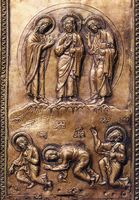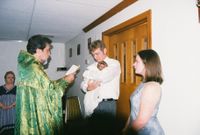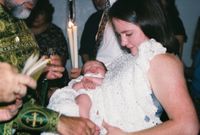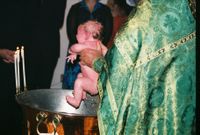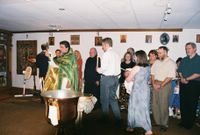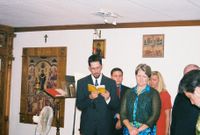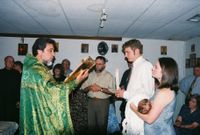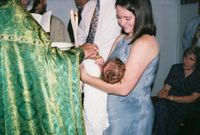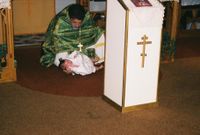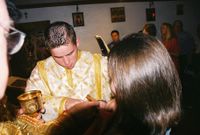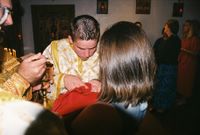These tracts, coming as they do from Ben Lomond, CA, have a decidedly formerly-Protestant bent and are written to address objections many Protestants would have concerning Orthodox doctrine and/or practice. I suppose I should start out by saying that the above can be taken as absolutely true. No saint's prayers or actions should ever be taken as being done apart from the will of God Himself. If things "get done" in the spiritual realm, it is ultimately because the Lord willed it, and it was ultimately done. It is most definitely NOT an issue of someone saying, "Well, the Lord must not like me very much, worthless sinner that I am; I'll just pray to the Theotokos or St. So-and-so, in the hopes that they'll 'talk God into' granting my request." This use of the saints and the Holy Mother--wherein they are pitted against the Lord of all as a sort of "buffer against an angry God"--is both an insult to these faithful servants of the Most High God, and an affront to the ever-loving, always-forgiving nature of our Lord. In this, the tract does well in saying that the prayers of the saints are always in line with the Lord's will, and that, in terms of what is ultimately accomplished, one saint may plant through his prayers, the Holy Theotokos may water through her intercessions or actions, but it is ultimately God who gives the increase.Can the saints answer our prayers directly? Is it within their power to grant our requests? The prayers of our brothers and sisters in Christ here on earth are only effective insofar as God answers them. It is the same with the intercessions of the saints in heaven for us. They can never answer prayers of their own accord or in their own power; they can only beseech Christ on our behalf. To imagine that prayer to the saints means that they can grant our requests apart from Christ is a totally unacceptable idea according to Orthodox theology and practice. So when we pray to the saints, the understanding is always clear that we are asking them to help us by praying to God, and not by their own power or actions apart from Him.
Why, then, the hesitating tone of this post? It is not to refute this particular passage, but perhaps to complement it. It is easier for a former Protestant to get his or her mind around the saints in heaven merely praying for us in some sort of "eternal prayer meeting"; it is quite another thing to imaging the saints themselves doing battle, delivering messages, appearing to those on earth...being actively involved in matters of men's salvation, in other words. When we pray, "Most Holy Theotokos, save us," we all know that it is not a cry for her to ascend the Cross in the flesh--only her divine Son could do and indeed did do that--but is it more than just a cry for her to "pray for us sinners"?
Indeed, the post-communion prayer to the "All-Holy Theotokos" in my prayer book says the following:
O All-holy Lady Theotokos, light of my darkened soul, my hope, my shelter, my refuge, my consolation and my joy: I thank thee that thou hast accounted me worthy, although unworthy, to be a partaker of the immaculate Body and precious Blood of thy Son. But do thou, who gavest birth to the true Light, enlighten the mental eyes of my heart; O thou who didst bear the fountain of immortality, quicken thou me who lie dead in sin. O compassion-loving Mother of the merciful God, have mercy upon me, and grant me humility and contrition of heart, and meekness in my thoughts, and deliverance from the bondage of my vain imaginings. And account me worthy, even unto my last breath, to receive without condemnation the sanctification of the immaculate Mysteries, unto the healing of both soul and body. And grant unto me tears of repentance and confession, that I may hymn thee and glorify thee all the days of my life: for blessed and glorified art thou unto all ages. Amen.This is the sort of prayer that seems to depart from the merely static status of intercessors many former Evangelicals give to the saints; indeed, many Evangelicals would be horrified at this prayer, as it seems to attribute characteristics and deeds to the Theotokos that are (or should be) reserved for Christ our God alone. What, then, do we as Orthodox say to this?
We all know--it is evident enough in our hymns--that only one is God: the Father, the Son, and the Holy Spirit, the Trinity, one in essence and undivided. The Theotokos is not included in this object of worship, nor is any other saint. We need not go further into this. It seems to me, however, that the prayer quoted above seems to lend itself rather nicely to the idea St. Peter put forth--that we shall be partakers of the divine nature--and that St. Paul expressed--that we shall see Him as He is and shall be like Him. Christ said we shall do the things He did; why is it so hard to see the Mother of our Lord, close to Him as she now undoubtedly is, doing things in His name and for His glory in our lives?
The Theotokos has been seen over naval ships in battle, has intervened in the lives of such prominent saints as St. Nicholas of Myra and St. Mary of Egypt, and has been depicted in countless icons which miraculously weep tears and/or produce healing myrrh. Are we to infer from this that she is to be sought out instead of Christ, that she is just as good a refuge as Christ for our souls, or that she is a safer advocate when compared to the strict, austere Judge of the Nations? I do not think so, yet this is an accusation raised by many Evangelicals, most noticeably those who have spent any time in predominantly Roman Catholic countries where the Blessed Virgin or the Saints are held up in almost god-like reverence, with (so it would seem) scarcely a reference to the Lord of these saints.
To (finally) answer the objection raised by the well-meaning Evangelical, I would say that, in asking the Theotokos and the Saints to save us, to protect us, to make us worthy of everlasting life, to shelter and protect us, to guide us to the eternal kingdom etc., we should not look at them as replacements for Christ who are somehow in opposition to Him, but rather as ambassadors for Him who always seek to do His will. If a captain in the Army sends his general to do something in his stead, the general will (if he is a good general) act in complete obedience, acting in his general’s stead due to his captain’s absence. Will the general be praised for his works? Of course; he will, when the history books are written, be seen as a good and faithful general, who had a very real role in the overthrow of the forces of the enemy. So, too, are the saints honored and revered, for they not only pray and intercede with their most holy prayers, but also have been known to personally appear and minister to the faithful on earth and/or fight against the forces of darkness here on earth, all in the name of their (and our) Lord.
But, some might say, is our Captain not Himself able to accomplish these goals? Does not the idea of “generals” doing things “in His absence” relegate Him to a secondary role? Is it not blasphemous to share this Captain’s glory with His generals? Granted, the analogy of the Captain and his generals is an imperfect one. I would submit, however, that the action of the Lord’s using His holy ones to accomplish His purposes does not in any way take away from His glory in all things; rather, it increases it, for He is ultimately seen as the driving force behind it all. The commanding officer in battle is revered not only for his own exploits, but for his ingenious maneuvering of those under him. So, too, is our Lord blessed, not only for the salvation He has “wrought…in the midst of the earth,” but for the mighty acts He continues to enact amongst those still in this life through His faithful, departed servants. Is it possible that some will revere the servant in his or her obedience more than the Master? Yes, just as it was possible to say that one was “of Paul” or “of Cephas” or “of Apollos” in the first century AD. St. Paul, however, did not stop glorifying God through his actions simply because some could not see past him to Christ. Neither, then, should we deny the very real actions—worthy of very real praise!—done by the saints and the most holy Theotokos here on earth; Christ Himself has sent them—what an honor that must be!—to do something in His name…something which they, no doubt, will execute perfectly. In their obedience, He is glorified, yet they, too, are praised for their obedience to their Lord, and thanked for their very real and God-ordained part in our salvation.










